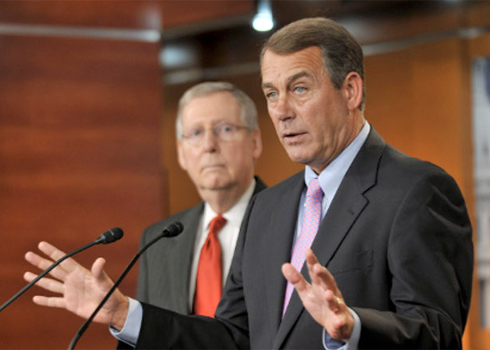House Speaker John Boehner (R-OH) and Senate Minority Leader Mitch McConnell (R-KY) have announced their selections to serve on the new so-called Super Committee — the panel called for in the debt limit bill that’s been tasked with reducing deficits by at least $1.2 trillion.
McConnell’s picked his Whip, Jon Kyl (R-AZ), as well as conservative freshman Sen. Rob Portman (R-OH), and arch-conservative Sen. Pat Toomey (R-PA).
Boehner tapped Reps. Jeb Hensarling (R-TX), chair of the GOP conference, and the caucus’ top message man; Dave Camp (R-MI) chair of the Ways and Means Committee, which controls tax revenue; and Fred Upton (R-MI), whose powerful Energy and Commerce Committee has broad jurisdiction over just about everything other than taxes, but particularly health care.
As head of the majority party in the House of Representatives, Boehner was asked to name the committee’s GOP co-chair, and for that he chose Hensarling — an extremely conservative member who in recent weeks falsely characterized the debt limit fight as a consequence of spending policies enacted by President Obama and past Democratic congresses. By quite a ways, most existing debt is the result of GOP policies, or bipartisan initiatives like the wars in Iraq and Afghanistan. Hensarling served on President Obama’s fiscal commission, headed by Erskine Bowles and Alan Simpson, but ultimately opposed their recommendations, because they included higher revenues.
But across the board it’s difficult to fathom any of the six Republicans on the committee agreeing to significant new revenues. All of them have signed Grover Norquist’s anti-tax pledge. None of the Senators participated in the bipartisan Gang of Six talks, which resulted in a plan that called for higher revenues. And many of them have helped lead the GOP fight against increasing taxes in any deficit package — part of a broader bid to force Democrats to agree to significant cuts to entitlement programs.
Kyl, who’s retiring at the end of next year, participated in a working group led by Vice President Joe Biden in the run-up to the debt limit brinksmanship. He ultimately abandoned those discussions, following Eric Cantor’s lead, when Democrats insisted it was time to turn from spending cuts to tax increases.
Portman was a member of the House for years, and headed President George W. Bush’s Office of Management and Budget for about a year in 2006 and 2007, during which time, of course, taxes remained low. He was one of many GOP senators to applaud the Gang of Six’s recommendations, which did call for revenues to be higher than they currently are, but his office quickly corrected the record: Portman “believes we have a spending problem, not a revenue problem, and that tax reform should be used not to increase revenue, but to bring about a more efficient and competitive tax code by lowering rates while clearing out underbrush.”
As former President of the far right anti-tax group Club for Growth, Toomey’s a lost cause. At an American Enterprise Institute event several weeks ago, he insisted zero dollars in new tax revenues. Not even if every dollar was matched by nine in spending cuts. Not even a single dollar. If all six members were like him, it would be perfectly safe to bet on immediate, unbreakable gridlock.
Once upon a time, Upton might have been willing to cut a deal that included tax cuts — but it’s hard to imagine that happening in the current environment. Same goes for Camp. But not in today’s house, where all Republicans of stature must genuflect to the Tea Party. It’s somewhat notable that Boehner appointed his top tax guy to the panel, if new tax revenues are really and truly meant to be verboten. But it’s just as likely a sign of something other than flexibility — territoriality perhaps, or vigilance, to assure that any tweaks to the tax code are revenue neutral.
We’ll have to wait and see whether any of these members are willing to budge on taxes, or whether they’re hell-bent on giving Democrats a choice between caving and triggering a $1.2 trillion penalty of steep cuts to defense and Medicare providers. But their pedigrees, and the growing momentum for an open process — which would require all involved to perform for their backers and bases — are poor harbingers.






